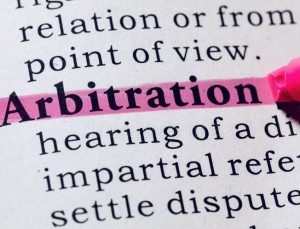MOVING TO ARBITRATION

If you are involved in a dispute ranging from a simple debt collection to a shareholder or third party contractor dispute, here are some quick tips that will help you.
- If you are looking at starting a lawsuit, you need to know that the trial courts generally known as Superior Courts of Justice are backlogged and are taking between five and seven years for cases to reach trial. The reasons for this are a lack of provincial government funding that prevents construction of new courtrooms and payment of salaries to judges and to court personnel.
- If you want and need a speedier resolution of your dispute and have not been able to negotiate or mediate an acceptable compromise, you may want to consider arbitration.
- In order to arbitrate you must agree with the other parties to do so. And usually this involves your signing a formal agreement containing an arbitration clause or at the very least an exchange of correspondence agreeing to arbitrate a specific dispute.
- To begin the process, you need to notify the other party in writing that you propose to arbitrate. Once he responds, you can discuss naming a single arbitrator, if you can agree on own or each name an arbitrator leaving those named to select a third arbitrator. Even if there are more than two parties to the dispute, provided that the dispute is two sided, three arbitrators is the norm.
- Since each party pays an equal share of the arbitrators bill, it is more economical for all to name a single arbitrator where possible. Remember, each party also has his own lawyer’s bills to pay.
- Once the arbitrator is selected, the next important step is a preliminary first meeting of the parties’ lawyers and there arbitrator. It is at this meeting that a flow chart will be negotiated containing a timetable of each procedure from beginning to end. The end is the arbitration hearing which is the equivalent of a court trial. It is at this preliminary first meeting that the parties have an opportunity to cherry pick the legal procedures they want to follow. The important point is that they are not bound to follow court procedure which can allow the process to move more quickly and less expensively.
- Once the arbitration hearing is finished, the arbitrator will review the evidence and provide written reasons known as an award. He will also award costs and interest to the winner. And if the parties agree appeals to the appellate court can be waived.
- A moderately complex, well run arbitration should take less than one year from beginning to end.

